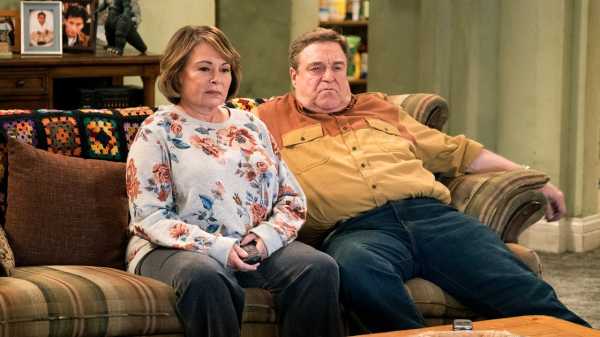
Roseanne Barr shot off her mouth, and the projectile, ricocheting, fatally struck her own show. Early on Tuesday, on Twitter, Barr waded into a conspiracy-theoretical discussion by likening Valerie Jarrett, the black attorney who was a senior adviser in the Obama White House, to an ape. (To be precise, Barr wrote, “muslim brotherhood & planet of the apes had a baby=vj.”) Not very much later on Tuesday, ABC cancelled “Roseanne,” two months after the show had returned from two decades of dormancy to become the top-rated comedy on television.
I suppose it is a relief to see that a network sitcom cannot withstand the heat of its star and namesake making a flagrantly racist remark. I need to wonder whether things might have played out differently if Barr had substituted a less blatantly disparaging insult. In an alternative universe where Barr kept her head, the show would go on. John Goodman would go back to “Roseanne” as Dan Conner, and Roseanne Barr would go back to being Roseanne Barr on Twitter, spouting corrosive anti-Semitism (“George Soros is a nazi who turned in his fellow Jews 2 be murdered in German concentration camps & stole their wealth”) and other forms of nonsense (“President Trump has freed so many children held in bondage to pimps all over this world”) that, less pungently disgraceful than her insult of Jarrett, and less well publicized, enabled her TV network to look the other way.
In our universe, the cancellation seems both surprising and inevitable, its arrival at once abrupt and badly overdue. Barr’s previous offscreen antics—such as accusing David Hogg, a survivor of the Parkland, Florida, school shooting, of giving a Nazi salute—did not inspire sufficient outcry to trouble her advertisers. Her in-character attacks on her colleagues—with Roseanne Conner dismissing “all the shows about black and Asian families” on ABC with a sneer—did not warrant a censure from the network. It is easy, from the outside, to believe that last nerves had been worn thin; the “Roseanne” showrunner Whitney Cummings bailed in the middle of May. The ambient nuisance of Barr’s bombast had become a thing to actively ignore.
The tweet insulting Jarrett couldn’t be ignored. Word of the cancellation came in a statement from ABC’s entertainment president, Channing Dungey. Posting Dungey’s statement to his Twitter account, Robert A. Iger, the chief executive of the Walt Disney Company, added, “There was only one thing to do here, and that was the right thing.” I am not sure if Iger meant to imply that the corporation did the right thing because it was the only viable option.
On Tuesday night, with a rerun of “Roseanne” booted from its 8 P.M. time slot, the viewer was left with choices including its replacement on the ABC schedule (a rerun of “The Middle”) and, much more tediously and much more aptly, live coverage of a Donald Trump rally at Nashville’s Municipal Auditorium. Trump’s victory had been the impetus for the return of “Roseanne”; according to a March piece from the Times, Dungey said the show’s success was “a direct result of [ABC’s] post–Election Day initiative to pursue an audience that the network had overlooked.” Trump had phoned Barr to congratulate her on the smash-hit ratings of her season première—a success he also seemed to interpret as a referendum on his own popularity. “Look at Roseanne! Look at her ratings!” Trump told rally-goers in Ohio. “They were unbelievable! Over eighteen million people! And it was about us!”
In Nashville, Trump did not broach the subject of this sitcom, though he may have been talking around it when emitting his tiresome culture-war salvos (about the national anthem at football games, about Jay-Z swearing while performing at a Hillary Clinton rally), and when proudly reiterating his line about the gang members of MS-13. “They’re not human beings,” Trump said. “What was the name?” He coached the crowd to shout out “animals.” Here was Tuesday’s dehumanizing-rhetoric scorecard: a sitcom disappeared with uncommon haste. An arena roared with responsive rage. Basic decency ended the day even, at best.
Sourse: newyorker.com






